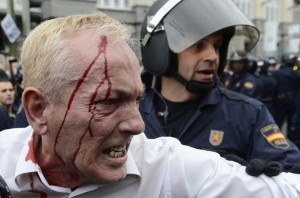
Whether or not the police in Madrid during the September 25 “Surround/Occupy Congress” protest acted with wanton brutality depends on whom you listen to. If it’s Interior Minister Jorge Fernández, then you’ll believe that the forces of order acted “magnificently” and “extraordinarily well” in the face of violent provocation. Likewise, the government’s delegate for Madrid, Cristina Cifuentes, deemed their behaviour “very professional”.
Leaders of the protest itself and some opposition parties have seen it rather differently, accusing the police of using disproportionate force.
A look at some of the day’s video footage reflects badly on both sides in the sense that some protesters and police clearly seem to have lost their heads (and this piece of film from Atocha station is particularly disturbing regarding the behaviour of the police). This sort of footage helps put the police in Madrid that much closer, in the mind’s eye, to the brutality that is routinely associated with Catalonia’s Mossos d’Esquadra force.
But after the streets around Congress were cleared, detainees were carted off and rocks and rubble were gathered from the floor on Tuesday night, it’s important to remember that the real problem this week in Madrid, when it came to proportionality and sense of responsibility, wasn’t out on the streets in the hands of baton-happy policemen.
Instead, it was in the alarmist rhetoric of a handful of politicians who utterly misjudged the situation. Chief among these was the Partido Popular’s deputy leader, María Dolores de Cospedal, who on Monday compared the next day’s protest to the attempted coup of February 23, 1981. Cifuentes also associated the protest with the attempted putsch of 31 years ago and the government’s tone leading up to Tuesday was akin to that of a nation under siege.
Making such a comparison is a flippant way to cite the 1981 uprising – a sinister and ultimately key episode of recent Spanish history. But it also heightens the sense of us-and-them that is being cultivated in Spain and which the country hardly needs as it tries to navigate through the current crisis.
There were undoubtedly violent extremists involved in Tuesday’s protest. But most of the people there were no such thing. The young female lawyer, the middle-aged telecoms technician, and the unemployed youngsters that I spoke to at the demonstration had very real problems to be angry about – not least the feeling that the government doesn’t listen to them.
If Cospedal wanted to ensure that Spaniards envisage her and her political class as being locked away in a Congress-shaped ivory tower, with no grasp of the common man’s problems, then accusing mainly peaceful protesters of plotting a coup was an effective way to go about it. The government clearly has little inclination to cede to the demands of those who are routinely taking to the streets to protest against its economic policy. But its inability, or refusal, to communicate effectively with the electorate is turning a divide into a yawning chasm.
The PP Government needs to have the people with them during this crisis period.Making hot headed comments for short term political gain is not going to help.The growing pan European fear is that the Rajoy Government lacks the political and economic knowledge to lead Spain to better times.A coalition Government or maybe one of technocrats may be the result.